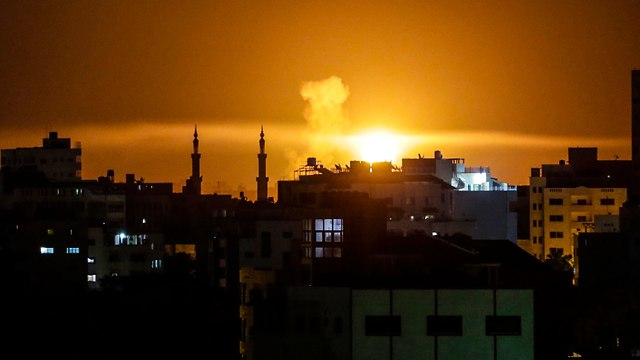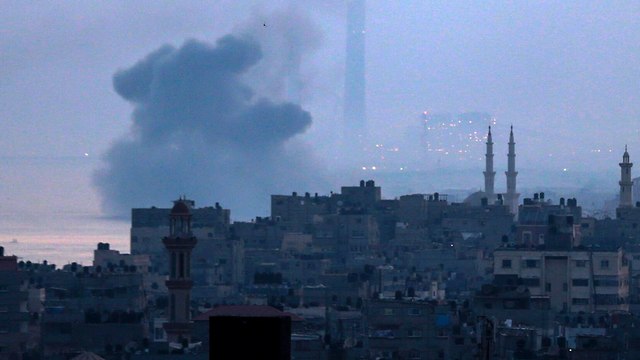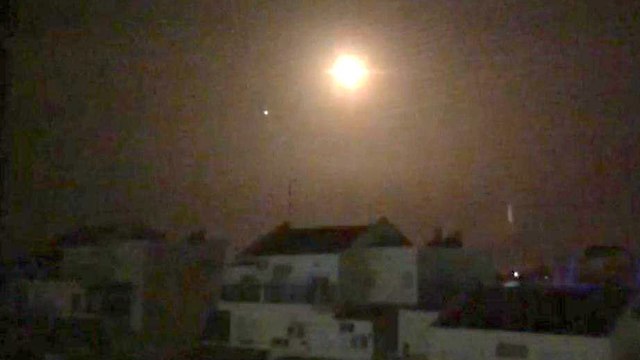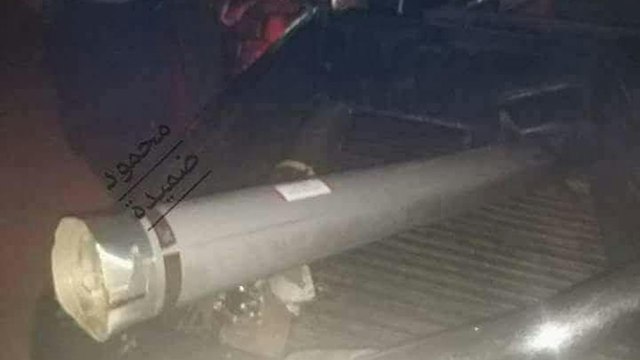Analysis: Seeking to turn the strip into Islamic State’s ‘Sinai district,’ radical Muslim organizations fired rockets at the Gaza vicinity communities Saturday night in a bid to get the Israeli army to enter the strip for another round of fighting. Meanwhile, the only reasonable solution as far as Israel is concerned is a long-term arrangement with Hamas.
Saturday night’s rocket fire from the Gaza Strip was likely carried out by Salafi Islamist organizations, which Israeli officials refer to as “rebel” groups. The radical Muslim members of these organizations wish to turn the strip into the Islamic State’s “Sinai district” branch.
Hamas and Islamic Jihad, which belong to the political Islam, are these groups’ bitter enemies and are constantly trying to destroy and target their members, seeing them as a threat to the Hamas rule in Gaza.
The Salafi group’s strategy is to get Israel to do their job for them. Their goal to get the IDF to enter the strip for another round, which will include a ground invasion. In this round, they believe, the IDF will eliminate the Hamas rule and maybe even replace it or bring members of Mahmoud Abbas’ Palestinian Authority to control the strip.

Either case, the radical groups believe, would make it easier for them to act, as the regime would be less violent and would receive less support from the population compared to the Hamas government, facilitating their cooperation with Islamic State operatives in Sinai who are fighting Egypt.
Aware of the explosive situation and knowing Israel will retaliate against Hamas targets, the members of these organizations are doing everything they can to prevent an arrangement that will leave Hamas in power for a long time.
Cairo is scheduled this week to host a meeting for a long-term arrangement in Gaza, both of the economic situation and of the security situation, and the rebels are interested in preventing this meeting from succeeding. That’s why they are firing rockets and mortar shells.

Another reason is the anger in the Gaza Strip following the killing of a Palestinian nurse during the fence riots. On Saturday, thousands attended the funeral of 21-year-old Razan Ashraf Najjar, a volunteer medic, whose apparent killing by IDF troops is still being investigated by the army.
These appear to be the two reasons prompting the rebel organizations to launch occasional rockets, knowing that the IDF will respond to make Hamas prevent them from firing.
They are also hearing the Israeli media’s interview with residents of the Gaza vicinity and they know that without a lot of effort, although their rockets don’t endanger the residents and although the Iron Dome system intercepts the rockets that do endanger the residents, they can disrupt the residents’ lives by making them sleep in their safe rooms and traumatizing their children.
Then, the rebels hear interviews with the heads of the Gaza vicinity regional councils, and they know that the government in Jerusalem is being pressured to enter Gaza and put things in order, and that’s exactly what they’re hoping for. Hamas usually tries to prevent the rebel groups’ from firing rockets, but it’s quite possible that it gave them free rein following the nurse’s killing.

There is no doubt that Hamas is deterred and was deterred by the IDF’s activities in the past week, which is why it is avoiding firing rockets itself. It is also imposing its authority on the Palestinian Islamic Jihad, and the fear of IDF strikes along with the Egyptian pressure are doing the trick.
The problem remains unchanged. This pattern of rebel fire, an Israeli response, and so on and so forth, harms the Gaza vicinity residents’ routine life and causes them a lot of suffering, if only as a result of the repeated sirens at night. It may also drag the IDF and Hamas into a conflict they aren’t interested in.
Meanwhile, the IDF has realized once again that it has a problem detecting from the air rocket and mortar launched from areas with abundant flora using “timers” or launching pads installed underground. Two radical Muslims sit in a bush with a launcher, attach a kitchen timer and flee, and the Gaza vicinity residents run into the bomb shelters. Hamas can’t catch all of them, even when it wants to, and especially when it’s more convenient to turn a blind eye.

The answer seems to be a ground invasion that would make it possible to physically locate these launchers and destroy them, but that would require the IDF to remain in the strip for a long time. This means that there are two long-term solutions for the current conflict in the Gaza Strip, which is expected to escalate on Tuesday, Naksa Day, when the Palestinians mark the Arab armies’ defeat and the Palestinian defeat in the Six-Day War.
One solution is that the IDF will enter Gaza and reoccupy the strip or parts of it. The IDF and Shin Bet will remain there for a long period of time until they forcibly dismantle all of Hamas and Islamic Jihad’s military “assets,” including rockets and tunnels. Such an operation could take a long time, cost hundreds of millions of shekels and solve the problem for no more than five or six years, if and when the IDF pulls out of the strip. There is no one else at the moment, including the PA, that is willing to take responsibility for the strip.
Potential mediators: Ireland and Scandinavia
So the only reasonable solution, as far as Israel is concerned, is a long-term arrangement with Hamas in Gaza, which will see the terror organization partially disarming from its heavy weapons and tunnels. In return, about 2 million Palestinians in Gaza will be given the option of gradually relieving their distress through an ease of movement restrictions and international investments in the strip’s economy. Even Hamas knows there isn’t a sensible investor who would be willing to put his money in a place prone to a violent outburst at any given moment.

At the moment, Israel’s favored mediator for such an arrangement is Egypt. We must admit, however, that the Egyptian intelligence operating on behalf of President Abdel Fattah al-Sisi has failed to demonstrate remarkable negotiating skills. They play for time, move slowly, and mainly think about how to serve Egypt’s interests rather than the interest of reaching an arrangement.
Behind the scenes, therefore, Israel should save the Egyptians’ face but seek the involvement of other mediators, who are more skilled in negotiations and have the ability to secure investments in the strip if an arrangement is reached. I am particularly referring to European countries, including the Scandinavians and the Irish, who have already proved their negotiating skills although they are not particularly fond of us.
When it comes to negotiating with clients like Hamas and Islamic Jihad, even the Scandinavian and the Irish are possible mediators.
As reported by Ynetnews
